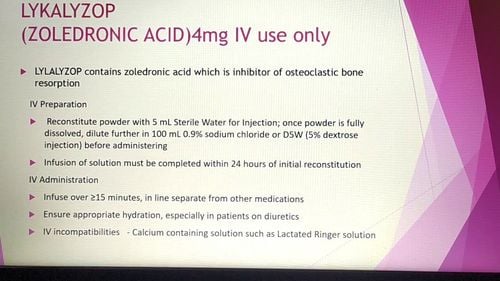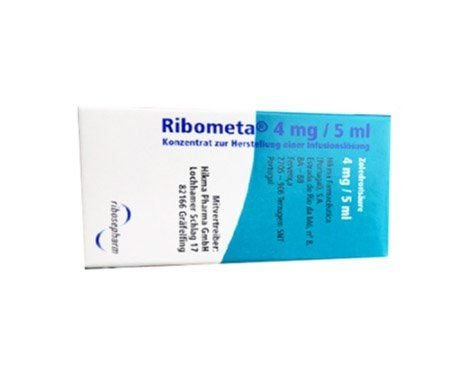This is an automatically translated article.
Sinresor medicine has the main ingredient zoledronic acid (as zoledronic acid monohydrate) 4mg. The drug is used to treat bone-related diseases and cancers. Here is some useful information about Sinresor to help patients learn carefully before using it.
1. What is Sinresor?
Sinresor belongs to the group of anti-cancer drugs and affects and immune system. Sinresor is manufactured in the form of lyophilized powder for injection and packed in boxes of 01 powder vial + 01 5ml syringe of water for injection.
Sinresor medicine has the main ingredient zoledronic acid (in the form of zoledronic acid monohydrate) 4mg along with some other excipients, just enough for 1 vial.
2. What does Sinresor do?
Sinresor is used in the following cases:
Treatment and prevention of bone-related diseases such as pathological fractures, radiation or bone surgery and spinal compression. Treatment of patients with advanced cancer , including bone cancer . Treatment of blood calcium due to cancer.
3. Dosage - How to use Sinresor
3.1. How to use Sinresor is prepared in the form of lyophilized powder for injection and is used by infusion.
3.2. Dosage The dose of Sinresor drug depends on each case, the subject and the course of the disease. The recommended dosage is as follows:
Prevention of bone-related events in patients with advanced cancer:
Dosage for adults and the elderly: Use the recommended dose of 4mg of zoledronic acid mixed in daily amounts. solution and further diluted with 100 ml of 0.9% w/v NaCl solution or 5% w/v Glucose solution for infusion. Administer the diluted drug by intravenous infusion for a period of 15 minutes each time, about 3-4 times. In addition, when treated with Sinresor, patients still need to be supplemented with 500mg of calcium and 400IU of vitamin D during the day. In case of treatment of hypercalcemia in malignancies:
Dosage of Sinresor for adults and the elderly: The dose of the drug is 4mg of zoledronic acid in a solution that has been prepared and continues to be diluted. to transmit. Use injection or intravenous infusion techniques. It should be noted that the patient must be adequately rehydrated before and during treatment.
4. Contraindications when using Sinresor
Some cases should not use Sinresor to treat the disease, including:
The patient has a history of allergy to zoledronic acid and some excipients in the drug. Pregnant and lactating women. Persons being treated with other bisphosphonates.
5. Sinresor drug interactions
Some Sinresor drug interactions have been reported including:
Before using the drug, it is necessary to dilute the reconstituted solution with 0.9% w/v NaCl solution or with 5% m/v Glucose solution. in order to avoid incompatibility. Lactated Ringer infusion solution must not be used to mix the prepared solution during treatment and some infusion solutions containing calcium and divalent cations. Note When using Sinresor, it must be administered by a separate infusion line. in combination with other drugs.
6. Side effects of the drug Sinresor
During the use of Sinresor, patients may experience some unwanted side effects as follows:
Common:
Anemia; The phenomenon of reducing platelets, white blood cells in the blood; Feeling light-headed, having a headache; Disorders of taste; Conjunctivitis ; Feeling nauseous, vomiting, loss of appetite; Suffering from bone pain, muscle pain and body aches. Rare:
Whole-body thrombocytopenia; Feeling anxious all the time, having trouble sleeping; Have a heart rhythm disorder; Decrease in blood magnesium and hypokalemia. If you experience these symptoms, you need to stop using Sinresor and notify your doctor for appropriate treatment.
7. Precautions when using Sinresor
Before using Sinresor, patients need to assess their health first to make sure they have been properly hydrated. Caution should be exercised in rehydrating patients at risk of heart failure while using Sinresor. The starting dose of Sinresor for patients requires careful monitoring of standard metabolic parameters related to hypercalcemia such as: Measurement of serum concentrations of Calcium, Phosphate and Magnesium. In case of hypocalcaemia, hypophosphataemia or hypomagnesaemia, the patient needs additional treatment for a short time. As for patients with some degree of renal insufficiency, they will not be treated with increased calcium in the blood with Sinresor, so it is necessary to be careful in the treatment when the patient has problems with body failure. Because Sinresor contains the drug zoledronic acid, patients should not be treated simultaneously with Aclasta. No clinical studies have established the safety and efficacy of zoledronic acid in pediatric patients. Patients with Renal Impairment: Patients need to consider whether their potential benefit from being treated with zoledronic acid avoids the potential risk. The safety of the drug in pediatric patients with renal impairment has not been established. Patients with hepatic impairment: There are no special recommendations for patients with hepatic impairment when using this Sinresor drug. In fact, there are very few clinical data in patients with severe hepatic impairment. When treating bone metastases with Sinresor, it is necessary to consider the decision because the effectiveness of treatment only begins after 2-3 months. Patients using the anti-osteoporotic group Bisphosphonates will cause kidney dysfunction. Factors that damage kidney function include: Dehydration, pre-existing renal failure. While the risk is reduced by infusion of 4 mg zoledronic acid > 15 minutes, damage to renal function can still be experienced. In fact, there have been reports of kidney damage, progression to renal failure, and dialysis in patients after initial or prescription doses of zoledronic acid. Some patients at the recommended dose have experienced an increase in serum creatinine but prolonged use to prevent skeletal related events, although this side effect is less common than other cases. other. Before each dose, the patient should have the serum creatinine level assessed. In adult patients with bone metastases with mild to moderate renal impairment, a low dose should be used when starting Sinresor. In patients with evidence of renal damage during treatment, the drug should be reintroduced only when creatinine levels return to within 10% of baseline. Because of the strong effect of zoledronic acid and bisphosphonates on renal function, clinical safety data are lacking in patients with severe renal impairment. There are also very limited pharmacokinetic data in patients with severe renal impairment at baseline (ClCR < 30 mL/min), so its use in patients with severe renal impairment is not recommended. Above is all information about Sinresor, patients need to carefully read the instructions for use, consult a doctor / pharmacist before using. Sinresor is prescribed by a doctor, patients do not arbitrarily take the drug without a prescription.













